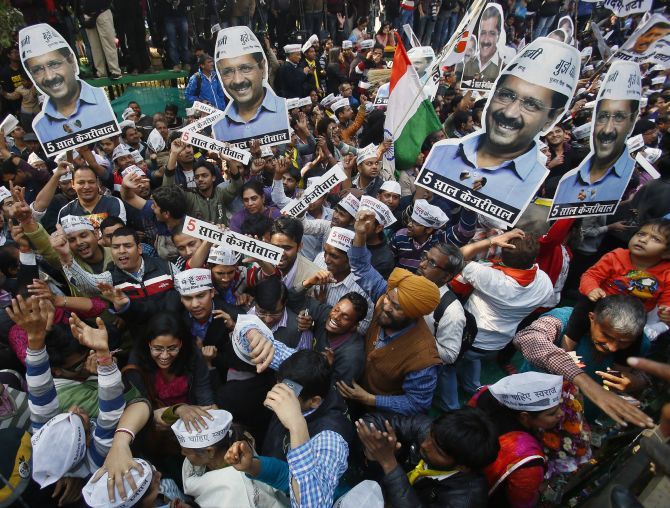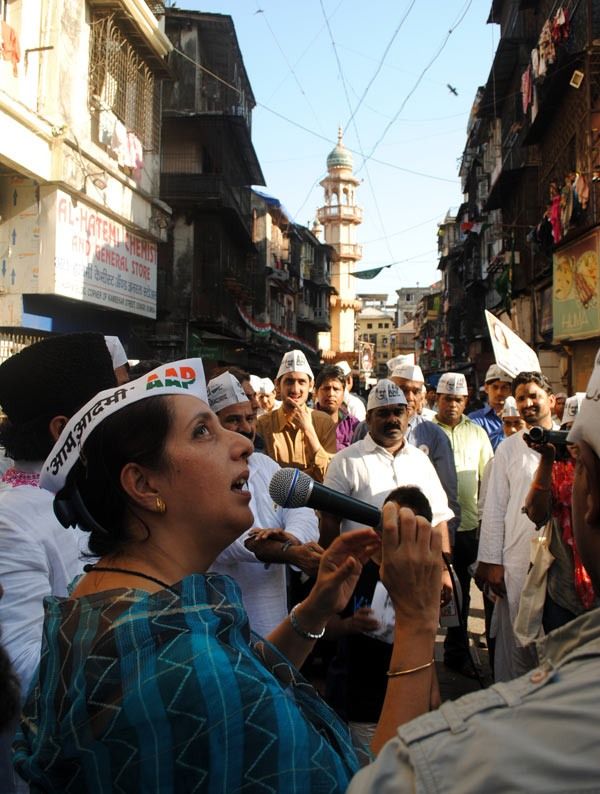 'If there is one message coming out of Delhi, it is that the country is ready for inclusive, bipartisan politics, not based on caste, community and religion, but based on issues of a modern India.'
'If there is one message coming out of Delhi, it is that the country is ready for inclusive, bipartisan politics, not based on caste, community and religion, but based on issues of a modern India.'
Banker-turned-AAP politician Meera Sanyal tells Vaihayasi Pande Daniel/Rediff.com how Delhi was won, and how a victory of the people could come to Mumbai.
Meera Sanyal has been in Delhi campaigning for the Aam Aadmi Party for the last four months, she says, returning to Mumbai only for urgent errands.
After a 30-year career in banking, Sanyal resigned as chairman of the Royal Bank of Scotland to join politics, contesting and losing the Mumbai South seat in two successive Lok Sabha elections. In 2013 she joined AAP and has been an active member campaigning with Arvind Kejriwal and Medha Patkar in the last Lok Sabha election and the Delhi Vidhan Sabha election.
Sanyal shares her insights from AAP's Delhi campaign with Vaihayasi Pande Daniel/Rediff.com
What do you feel about the win in Delhi?
It is a wonderful day for everyone who supported honest politics and clean, trustworthy governance.
It is really a victory of the people.
The reason we won in Delhi is because it was a very positive vote. Not just for Arvind Kejriwal and the Aam Aadmi Party, but for every one of our candidates.
What is not very well recognised is that our candidates who won in the last Vidhan Sabha elections have done a really good job.
I was going from jan sabha to jan sabha (people's meetings) and people were just holding up report cards.
Every MLA gets Rs 4 crores (Rs 40 million) a year to spend. They (AAP MLAs) have gone out into their constituencies and had series of mohalla sabhas (locality meetings), engaged with the Indian welfare associations, across the board, across socioeconomic strata and spent practically all of their four crores.
They said what do we need to do. And they went and did it honestly. Candidates won just for holding up report cards saying: 'Listen we had asked you. You said this. And this is what I have spent the money on. 22 water projects, 32 sewage projects, so much garbage (removal).'
Over a year?
Basically since a year. They were elected in December 2013 and they resigned February 14. Between then and the time that the assembly was dissolved they actually went and did the work that an MLA is supposed to.

Image: AAP politician Meera Sanyal on the campaign trail in Mumbai during last year's Lok Sabha election. Photograph NV Reuben/Rediff.com
That was very powerful. That message carried. The MLAs who didn't get elected (in December 2013), they just continued working in their constituencies. There was no guarantee they would be a candidate. But they just kept working there.
As we were going out to jan sabhas -- we started campaigning several months ago -- you could see that these guys, and we were with people who didn't even know they were getting the seats, they were just going out and saying we are an honest party, we are sincere people, let us engage with you.
I think the candidates have won this election in a very positive way.
How did they conquer or stand up to the Modi achche din wave?
Elections in the end are very local. They want to see tangible results. They want to see what is happening. 'How is my life changing? What is happening here? How is the garbage outside my house getting removed? Who is the person? Who can I go talk to?'
Because in the end you can't go talk to the prime minister for every problem. You can't even go talk to the chief minister. But you can talk to your local MLA. And if the person is accessible and honest and doing work, then that is very powerful, right?
Because it was a state election and not a national election?
Every election is local. I have fought two MP elections. Everybody is interested in my sewage, my garbage, my water, my electricity, my price of onions.
Everyone is interested, whether you live in Malabar Hill (south Mumbai) or you live in a jhuggi. People are interested in what concerns them. Every election is very local.
Of course, the national mood makes a difference.
We should really acknowledge that there is a very positive vote in favour of (AAP) candidates.
Secondly -- which was downplayed by the media a lot -- that in the 49 days that Arvind Kejriwal formed the government there was real change in Delhi. Corruption was noticeably less across the board.
You talk to people, people said whether they were an auto driver or a resident welfare association in Jor Bagh (a posh Delhi area), the corruption levels fell.
People were scared that someone would take action. So corruption was down.
Some of the promises we kept, for example, school admissions (became) noticeably easier. Of course, there was bijli and pani. But there were also other things.
What the government had said, they did. Jo kaha so kiya (what they said they did). And people said: 'Yes, this was correct'.
This was being trashed by the media, that 'You ran away etc'... People on the ground knew there was a real difference.
The third very positive thing -- and I am very happy to have been associated with -- were the Delhi Dialogues, where we said we are going to run a positive, issue-based campaign.
Please track the campaign. There was no negativity. There was no mud slinging. There was no name calling.
For the last four months, we have been working flat out on the Delhi Dialogues through which we built our manifesto and action plan. We went out and spoke to ward after ward on women's issues, youth issues.
What are your problems? What are the tangible solutions that an elected government in Delhi can deliver (we asked them). Very focused. Very to the point, very straightforward, very executable. People respect that.
I think these things made a really, really, big difference.
It has been said that Arvind Kejriwal's campaigning was quite different and made an impact.
One of the things, as I said, it was positive which was a good way to do it. Very focused and very issues based.
If you look at the way we addressed our constituencies it wasn't by caste, class and all of that. It was by constituency -- what are the common problems (of a constituency).
For example, we addressed youth and we had something called Youth Dialogue. It doesn't matter if you came from a rich family or a poor family or a Brahmin family or a Muslim family, all young people have the same issues -- You can't get admission anywhere and you can't get a job.
We went across constituencies talking to women. Women everywhere in Delhi and, by the way, in many parts of our country have the same problems. One of them is security. And that is the number one problem.
There are thousands of problems that women have. We said we will prioritise. We will focus on security. Because that, in our books, is the number one issue.
All of this is really hard work on the ground. It is the hard work of the candidate, it is the hard work of the 49 days, it is the hard work of the Delhi Dialogues.
It was positive and issue based. I think people are tired to, be quite candid, of the name calling, of the tu tu mein mein, of the negativity, of the cynicism, they think bas let's get on with it.
Let's focus on what can be done and let's be positive.
Personally, I think that played a big role and it is really a victory of the people.
How can it translate and spread to a city like Mumbai? Why hasn't Mumbai been as AAP friendly?
I certainly hope to be. One of the reasons why I was so closely involved in Delhi was, of course, that as you can imagine, after the Lok Sabha elections there were a lot of people who were disheartened and despondent.
I will tell you something from my personal experience. The great thing about fighting and losing once is that you learn what to do next time.
I learned an election is binary. You either win or you lose.
So (after) 2014 one of the things I personally did was that my last pamphlet, which I sent out to 400,000 to 500,000 houses, (said) 'Listen, whether I win or lose, these are the things I am committed to doing. And this is my ten point agenda.'
From the day after the elections that was what I started. Port land was a very big part of my campaign. And I can tell you every day I have worked on it. And now we are seeing results.
We had a landmark judgment from the Bombay high court. Tomorrow (February 12), in fact, I am going for a hearing which is why I am in Bombay and not in Delhi.
My message is that we are all part of the problem and we are all part of the solution. Let us step up and be active citizens of this country. We don't have to all be politicians, but we can all be active citizens.
If there is one message that I think is coming out of Delhi, it is that the country is ready for inclusive, bipartisan politics, not based on caste, community and religion, but based on issues of a modern India.
If anyone takes away a message, I think that should be the message of the Delhi elections.
What are the difficulties in doing what was done in Delhi, in Mumbai? What makes an AAP victory in Delhi easier compared to Mumbai?
Let us not underestimate the fact that we have had really superb volunteer support. You cannot imagine: The voluntary base in Delhi was extraordinary.
The local Delhite has been completely committed, supporting us. But also people came in from all over the country.
There were thousands of volunteers from across (the country) -- there were 700 volunteers from Maharashtra. And there was the NRI support base.
And if you focus on a place -- there was a tremendous focus on Delhi -- you get good results.
We as a party need to build our organisation grassroots up. Hopefully, this will all gives us the energy to do that.
My sense is that politics is a really long, long, haul. We should keep our feet to the ground, remain humble and grounded and work hard.
Maybe in 5 years, 10 years 15 years we will see good results in other places as well. Delhi wasn't built in a day and I don't think Mumbai will be built in a day.
Let us hope we do the right thing, focus on delivery and live up to the faith that people have put in us.
REDIFF RECOMMENDS
- How Kejriwal rode the anti-Modi vote
- Kejriwal and the art of stopping Modi-Shah
- How AAP routed the BJP: Read this interview!
- The woman behind Kejriwal's success
- 5 Reasons Why the BJP Got It Wrong In Delhi
- 'AAP's win will change Indian politics forever'
Main Image: Aam Aadmi Party supporters with portraits of AAP leader Arvind Kejriwal, during celebrations outside the party office in New Delhi. Photograph: Anindito Mukherjee/Reuters










